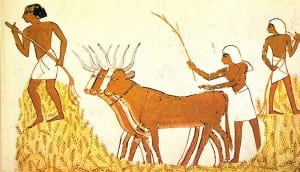Adaptation after Africa
By Freya A Boardman-Pretty, on 18 June 2012
The man outside the venue at first looked unassuming. “Let me give you a free handout,” he said. I began to reach out for the photocopied leaflet before noticing the title: Evolution – a lethal antiscience. “Do you know what antiscience is?” I had encountered a lot of different people at Cheltenham Science Festival, but not yet the evangelical campaigner.
Sadly, I didn’t have the time to get into a debate about whether his quotes from the Bible counted as evidence from a peer-reviewed publication, but the talk, Evolution out of Africa, proved to be a suitably enjoyable alternative. Mark Thomas, Angela Clow and Jonathan Rees told us about the adaptations humans migrating out of Africa picked up, and what they mean for us today.
Mark began by telling us about adaptations resulting from changes in the human diet. Advances in food culture greatly change how we work: tools for hunting, first used about two and a half million years ago, caused our diet to change from largely vegetable- to meat-based, providing us more energy for the expansion of that energetically-expensive organ, the brain.
One of the most significant dietary changes was a very recent one: the advent of farming. About 10,000 years ago humans began to cultivate crops, bringing radical changes to our diet. With small numbers of grains dominating instead of a wide variety of foraged plants, the breadth of the diet decreased, while the relative amounts of carbohydrates rocketed.
Dietary adaptations
Now, we’re living with the consequences. While our bodies are largely adapted to the low-carbohydrate hunter-gatherer diet, we need only pop down to the nearest supermarket to find ample provisions of energy-dense, high-carbohydrate food. And now we’re seeing great increases in obesity and type 2 diabetes our ancestors would never have predicted.
That’s not to say evolutionary change hasn’t occurred since agriculture began. One of the strongest and most drastic examples of human dietary evolution is the persistence of the lactase enzyme, which digests the sugar in milk. Most animals lose the activity of this enzyme by the time they become adults.
But about 7-8,000 years ago, a gene variant began to spread which allowed for lactase to be active throughout adulthood. Why? It was at about this time the domestication of milk-producing animals began; those who were able to digest milk were more likely to be able to consume enough calories to survive.
Skin adaptations
Next, Jonathan Rees introduced us to the human body’s best sunblock: hair. It protected our ancestors from the harsh equatorial sun, but as these ancestors gradually became less hirsuite, we needed something else to protect our skin. This turned out to be higher levels of the skin pigment melanin.
But if melanin is such a good protector against sun damage, why do we see less of it in the paler populations who have migrated out of Africa to higher latitudes? While melanin protects damage from too much sun, it also blocks one of its useful effects: stimulation of vitamin D production. At these higher latitudes where sunlight is scarcer, we needed less of a sunblock so that we could make enough vitamin D; individuals with less melanin, then, were more likely to survive.
Light vs. dark
Light-related adaptations are also the subjects of Angela Clow’s research. She told us how levels of cortisol, a stress hormone, show a strong 24-hour cycle. On awakening we experience a spike of cortisol, and the effect is much stronger when we’re waking up to light. When humans lived near the equator, with a fairly constant light-dark cycle throughout the year, the system worked well to synchronise our bodies to the daily rhythm.
But in high latitudes such as the UK, what happens in the depths of winter, when we wake up to darkness? It varies between us. While the average person’s cortisol is unaffected, people who suffer from seasonal affective disorder have a marked decrease in the amount of extra cortisol their body produces. These people are more likely to suffer anxiety and depression during the winter.
It was fascinating to hear about some of the changes that have occurred since groups of early humans left Africa, and how practices that seem so engrained into human life, such as agriculture, have occurred so recently during human evolution. Clearly how we respond to environments today can tell us a lot about our past.
 Close
Close


